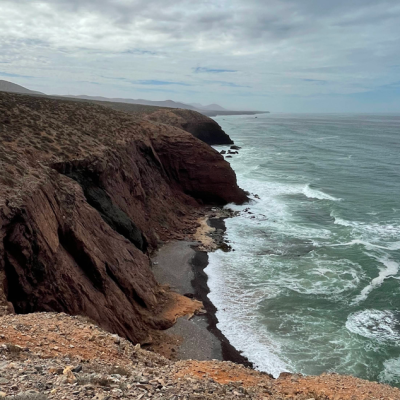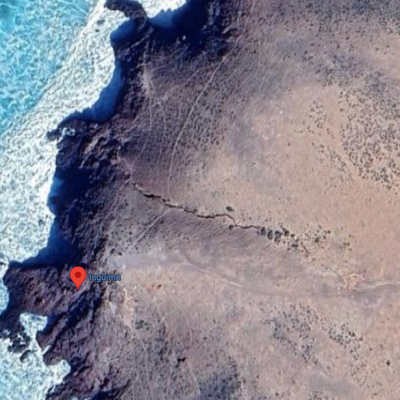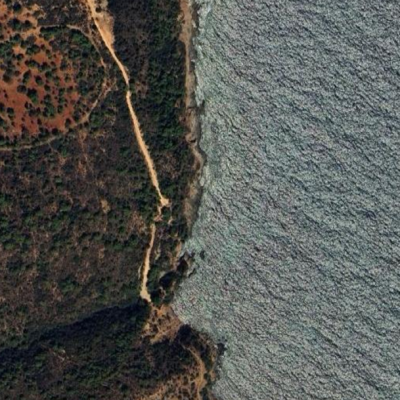How Southern Morocco’s Water Crisis Opens the Door to Regenerative Innovation
Morocco’s agricultural industry consumes approximately 80% of the country’s water resources. In 2024, the wheat harvest was nearly halved due to persistent drought conditions. Satellite imagery indicates that croplands, typically green during the rainy season, have turned brown and parched. In Morocco’s arid southern regions, oases are experiencing significant vegetation loss. The Middle Drâa Valley, home to vital oases, has seen a decline in date palm groves due to water scarcity and soil degradation.
The entire Guelmim-Oued Noun region in southern Morocco, where our site in Inguimn is located, is experiencing significant environmental challenges due to prolonged droughts, water scarcity, and climate change. These issues are impacting both natural ecosystems and agricultural practices, leading to notable changes in vegetation and land use.
This challenging context makes the site ideal for deploying the ReGen Desalination System, offering both local and global impact alongside promising returns for partners and investors.
Technology at a Glance
- 750 modular units combining desalination, irrigation, greenhouses, and IoT controls
- Solar-powered IoT sensors monitor soil moisture, salinity, temperature in real-time
- Fully off-grid, mostly automated system with precise water flow and energy monitoring
- Brine safely stored to manage by-products from desalination
- Water reservoir placed uphill for efficient gravity-fed irrigation
Economic Outlook
- The Site is designed for long-term profitability, low operating costs, and high resilience in a climate-challenged environment.
- The initial capital expenditure is over 580,000 USD with a total expenditure over the next 10 years of over 1,5 M USD. Yielding a land price increase of over 200x over 10 Years and a conservative estimated of 200,000 USD profits for this site per year depending on the focus on agriculture, material harvesting or carbon credits.
- Eligible for green grants, ESG funding, and climate innovation programs
- Already at a very below market value of water cost in the area of 0.0040 USD per litre, the project shows cost benefit within its amortisation period and can produce at 0.0040 USD per litre.
- On top of that the land price increase are very significant
- Carbon credit Benefits can cover operating cost if land is increased
- Additional opportunities can come from:
- Agricultural Produce
- Benefits from Harvested Material (Salt Brine processing)
- Social and Ecological Impact
- Potential Funding / ESG
Water and Biodiversity Facts
- Solar-powered desalination of ocean water below 0.0040/l USD, without groundwater extraction
- Gravity-fed drip irrigation minimises evaporation and runoff
- Reservoir ecology supports local flora & fauna and improves water quality
Soil Regeneration
- Low-organic, erosion-prone soils are improved with nitrogen-fixing and cover crops
- No synthetic fertilizers; organic biomass and root systems build soil structure
- Mulch-producing plants reduce salinization and moisture loss
This project combines renewable energy, smart irrigation, and modular water systems to create a fully autonomous and climate-resilient farming model.
The Takeaway
This project tells a story of turning crisis into opportunity. By combining renewable energy, smart irrigation, and modular water systems, it creates a climate-resilient farming model that can restore degraded land, secure water supplies, and generate economic returns. The site’s preconditions — from environmental challenges to local support — create a fertile ground for innovative regeneration that benefits people and planet alike.
Investors and partners should consider the strong ecological fit, cost advantages, and diverse revenue streams — including agriculture, carbon credits, and harvested materials — alongside existing funding programs that can reduce financial risks.
CONFIDENTIAL: This study is commissioned and owned by ReGen Technology Holdings (Hong Kong) Limited. For inquiries, contact admin@regen.technology
Prepared by Andreas Theisinger & Dr. Jane Wong for ReGen Technology




Want to learn more?
Feel free to request the full feasibility study through our contact form…
